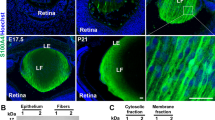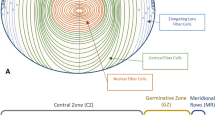Abstract
Differentiating vertebrate embryo tissues pass through a stage when they have the potential for several pathways of differentiation, some of them revealed only by experimental manoeuvres. As differentiation proceeds, the potential for alternative pathways becomes progressively restricted and is eventually lost. We have investigated the molecular basis for this phenomenon, using the chick embryo retina, which has a potential for differentiation into lens cells. This potential requires special conditions for its manifestation; it declines during development and is finally lost before hatching. Lens protein (crystallin) mRNA is expressed in early embryo retina: its levels decline in parallel with the decline in lens-forming potential. There is also evidence of an ontogenic change in post-tran-scriptional regulation. Such a relationship between heterolo-gous mRNA and heterologous differentiation potential may be of general application.
This is a preview of subscription content, access via your institution
Access options
Subscribe to this journal
Receive 51 print issues and online access
$199.00 per year
only $3.90 per issue
Buy this article
- Purchase on Springer Link
- Instant access to full article PDF
Prices may be subject to local taxes which are calculated during checkout
Similar content being viewed by others
References
Clayton, R. M. in Stem Cells and Tissue Homeostasis (eds Lord, B., Potten, C. & Cole, R. J.) 115–138 (Cambridge University Press, 1977); in Mechanisms of Cell Change (eds Ebert, J. & Okada, T. S.) 129–167 (Wiley, New York, 1979); Ophthal. Res. 11, 001–005; 006–012 (1979).
Eguchi, G. Ciba Fdn. Symp. 40, 241–258 (1976).
Okada, T. S. Tests of Teratogenicity in vitro (eds Ebert, J. D. & Marois, M.) 91–105 (North Holland, Amsterdam, 1976); in Current Topics in Developmental Biology (eds Moscona, A. A. & Monroy, A.) (Academic, New York, 1979).
Clayton, R. M., de Pomerai, D. I. & Pritchard, D. J. Dev. Growth Diff. 19, 319–328 (1977).
Pritchard, D. J., Clayton, R. M. & de Pomerai, D. I. Expl Eye Res. 27, 365–375 (1978).
Araki, M. & Okada, T. S. Devl Biol. 60, 278–286 (1977); Dev. Growth Differentiation 20, 71–78 (1978).
Araki, M., Yanagida, M. & Okada, T. S. Devi Biol. 69, 170–181 (1979).
de Pomerai, D. I. & Clayton, R. M. J. Embryol. exp. Morph. 47, 179–193 (1978).
Jackson, J. F. et al. Devl Biol. 65, 383–395 (1978).
Thomson, I. et al. Devl Biol. 65, 372–382 (1978).
Thomson, I., de Pomerai, D. I., Jackson, J. F. & Clayton, R. M. Expl Cell Res. 122, 73–81 (1979).
de Pomerai, D. I., Pritchard, D. J. & Clayton, R. M. Devl Biol. 60, 416–427 (1977).
Thomson, I., Yasuda, K., Clayton, R. M. & Okada, T. S. (in preparation).
Yasuda, K., Thomson, I., Okada, T. S. & Clayton, R. M. Abstr. Jap. Soc. Dev. Biol. Conf. (1979).
Author information
Authors and Affiliations
Rights and permissions
About this article
Cite this article
Clayton, R., Thomson, I. & de pomerai, D. Relationship between crystallin mRNA expression in retina cells and their capacity to re-differentiate into lens cells. Nature 282, 628–629 (1979). https://doi.org/10.1038/282628a0
Received:
Accepted:
Issue Date:
DOI: https://doi.org/10.1038/282628a0
This article is cited by
-
From DNA transcription to visible structure: What the development of multicellular animals teaches us
Acta Biotheoretica (1987)
-
Stimulation of crystallin synthesis in embryonic brain cells in culture
Roux's Archives of Developmental Biology (1986)
-
The problem of automation in animal development: confrontation of the concept of cell sociology with biochemical data
Acta Biotheoretica (1981)
Comments
By submitting a comment you agree to abide by our Terms and Community Guidelines. If you find something abusive or that does not comply with our terms or guidelines please flag it as inappropriate.



